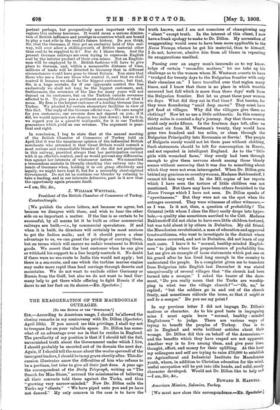THE EXAGGERATION OF THE MACEDONIAN OUTRAGES.
[To nut EDITOR OF THE "SFROTATOR.1
SIR,—According to American usage, I should berallowed the closing remarks in my controversy with Dr. Dillon (Spectator, April 18th). If you accord me this privilege, I shall try not to trespass far on your valuable space. Dr. Dillon has some- what of an advantage over me in that he resides in England. The peculiarity of my position is that if I should tell the full, unvarnished truth about the Government under which I live, I should probably be escorted out of its domain the next day. Again, if I should tell the same about the mocha operandi of the insurgent leaders, I should be in my grave shortly after. This dis- cussion illustrates anew the difficulties of him who refuses to be a partisan, but tries to give all their just dues. A year ago the correspondent of the Daily Telegraph, writing on " The Search for Miss Stone," accused the missionaries of believing all their converts told them against the Turks, and thus " growing very narrow-minded." Now Dr. Dillon calls the Turks my "clients." " We have piped unto you and ye have not danced." My only concern in the case is to have the
truth known, and I am not conscious of championing any " client " except truth. In the interest of this client, I now have a frank apology to make to Dr. Dillon. My accusation of exaggerating would seem to have been more applicable to the Novoe VTremya, whence he got his material, than to himself. I do not, however, absolve him from all blame in repeating its exaggerations unsifted.
Passing over an angry man's innuendo as to my know. ledge of certain "recondite matters," let me take up his challenge as to the women whom M. Westman asserts to have " trudged for twenty days to the Bulgarian frontier with only their chemises on." I have travelled over that region many times, and I know that there is no place in which trouble occurred last fall which is more than three days' walk from the Bulgarian frontier. But let us grant these poor women six days. What did they eat in that time P Not berries, for they were floundering "amid deep snows." They must have got food at villages. Why did the villagers give them no clothing? Now let us use a little arithmetic. In this country thirty miles is counted a day's journey. Say that these women could only make fifteen. In the fourteen days left, after we subtract six from M. Westman's twenty, they would have gone two hundred and ten miles, or clean through the Bulgarian Principality into Roumania or Servia! The people of Bulgaria surely would not let them pass without clothing. Such statements should be left for consumption in Russia, and not repeated in intelligent England. As to the " little girls with wrenched faces," they surely had been through enough to give them nervous shock among those bloody scenes without assuming that it was due to something about which they were not even interrogated. When Dr. Dillon gets behind my gracious ex-countrywoman, Madame Bakhmetieff, I cannot hit him very well. In the MS. copies of her reports which I have seen the torture of little children was not mentioned. But there may have been others furnished to the Novoe Vremya which I have not seen. Dr. Dillon speaks of "eyewitnesses." But they were not on the spot when the outrages occurred. They were witnesses of other witnesses,— as I was. Is it not, then, a question of probability? The Oriental (with whom I class the Slav) easily drops into hyper- bole,—a quality also sometimes ascribed to the Celt. Madame Bakhmetieff did not claim to have seen little children tortured, but was told about it by others in Dubnitza. My old friend, the Macedonian revolutionist, a man of education and approved trustworthiness, who went to investigate in the district where the scenes occurred, and not in Dubnitza, did not learn of any such cases. I leave it to "normal, healthy-minded English- men " to judge where the preponderance of probability lies. Let me give an example of loose statements which put one on his guard after he has lived long enough in the country to understand the people. In a complaint given me to translate from Bulgarian into English last December it was stated unequivocally of several villages that "the church had been turned into a mosque." I asked the bearer of the docu- ment, " Do you really mean that the Turks are worship.
ping in what was the village church ? Oh, no," he replied ; " but the soldiers go in and out of the church freely, and sometimes ridicule the icons, so that it might as well be a mosque." Do you see my point ?
In my previous letter I did not impugn Dr. Dillon's motives or character. As to his good taste in impugning mine I must again leave " normal, healthy - minded Englishmen " to judge. There are various ways of trying to benefit the peoples of Turkey. One is to sit in England and write brilliant articles about their wrongs. Dr. Dillon did this on behalf of the Armenians,— and the benefits which they have reaped are not apparent. Another way is to live among them, and give your time, thought, effort, and money for their uplifting. At this hour my colleagues and self are trying to raise 210,000 to establish an Agricultural and Industrial Institute for Macedonian youth, where, in addition to Christian education for the mind, useful occupation will be put into idle hands, and.solid, manly character developed. Would not Dr. Dillon like to help us P
am, Sir, &c.,
[We must now close this correspondence.—En. Spectator.]










































 Previous page
Previous page